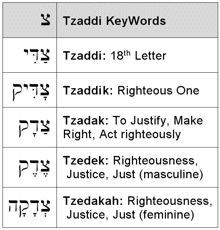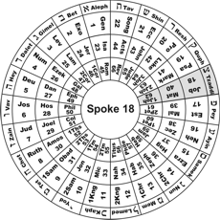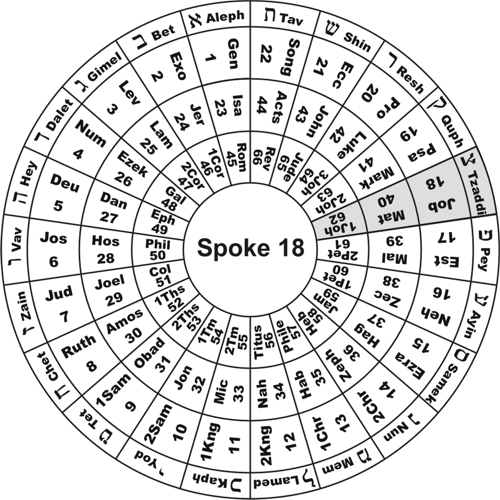God's Righteousness Goes Forth!
My little children, these things write
I unto you, that ye sin not. And if any man sin, we have an advocate with
the Father, Jesus Christ the righteous:
John 2:1 (Spoke 18, Cycle 3)
 Open the King James Bible to verse 137 of the great
alphabetic Psalm 119 and you will see these words: Open the King James Bible to verse 137 of the great
alphabetic Psalm 119 and you will see these words:
- AV Psalm 119:137 TZADDI. Righteous art thou, O LORD, and upright are thy judgments.
Thy testimonies that thou hast commanded are righteous and very faithful.
The word translated as "righteous" is the
fundamental Tzaddi KeyWord צדיק
(Tzaddik). This word, or its root צדק (Tsadek), appears in six of the
alphabetic verses. Here are the other five:
- AV Lam 1:18 The LORD is righteous (tzaddik); for I have rebelled against his commandment.
- AV Ps 145:17 The LORD is righteous (tzaddik) in all his ways, and holy in all his works.
- AV Ps 112:9b ... His righteousness (tzedakah) endureth for ever;
- AV Ps 119:142 Thy righteousness (tzedakah) is an everlasting righteousness.
- AV Ps 119:144 The righteousness (tzedek) of thy testimonies is everlasting:
This firmly establishes the symbolic meaning of Tzaddi, which has been recognized for millennia in the
Rabbinical Tradition. It governs the theme of the Book 18 in which Righteous Job is used of God
to address the question of why the righteous suffer. It also manifests in the
Inner Cycle of Genesis with Abraham's plea
in Genesis 18 for
God to withhold judgment against Sodom for the sake of ten righteous people that might be therein.
The reason God revealed His impending judgment of Sodom and Gomorrah to Abraham is
explained in terms of two Tzaddi KeyWords:
And the LORD said, Shall I hide from Abraham that thing which I do;
Seeing that Abraham shall surely become a great and mighty nation, and all the nations of
the earth shall be blessed in him? For I know him, that
he will command [yitsevah] his children and his household after him, and they shall
keep the way of the LORD, to do justice [tsadekah] and judgment; that the
LORD may bring upon Abraham that which he hath spoken of him.
Genesis 18.17f
The word translated as "justice" is simply the feminine substantive formed from the verb Tsadek.
The word translated as "he will command" is from the root צוה (Tsavah)
which is another fundamental Tzaddi KeyWord, closely associated throughout Scripture with righteousness.
Tsavah (Command) appears in the second Tzaddi verse of Psalm 119:
- AV Psalm 119:138 Thy testimonies that thou hast commanded are righteous
and very faithful.
Tsavah (Command) also appears in the alphabetic Psalm 111:
- AV Psalm 111.9b ... he hath commanded his covenant for ever: holy and reverend is his name.
The words Tsadek (Righteous) and Tsavah (Command) define interwoven twin themes
that manifest with unparalleled clarity in 1 John, as discussed
at length in the article Jesus Christ the Righteous!.
The elemental force of the letter can be seen by analyzing words formed from simple
combinations with other letters. The simplest
such word is formed from its combination with Aleph to form the qal imperative verb
צא (Tsey!) which is the command Go Forth! The first occurrence
of this exact word is found in Genesis 8.16 when God commanded Noah to "go forth"
from the ark after the flood had receded.
This is the primary elemental force of the Letter Tzaddi. It is the essence of the idea of a command which
is exemplified by the transformation of the command צא (Tsey!, Go Forth!)
into צוה (Tsavah, Command) by the insertion of a Vav (ו)
between the Tzaddi and the Aleph. The words are closely related.
All these ideas combine in the great theme of the Gospel of God's Righteousness
simultaneously bursting forth on
Spoke 18 in the Bible Book 40 (Gospel of Matthew),
Isaiah Chapter 40, and
Psalm Chapter 40.
| 


